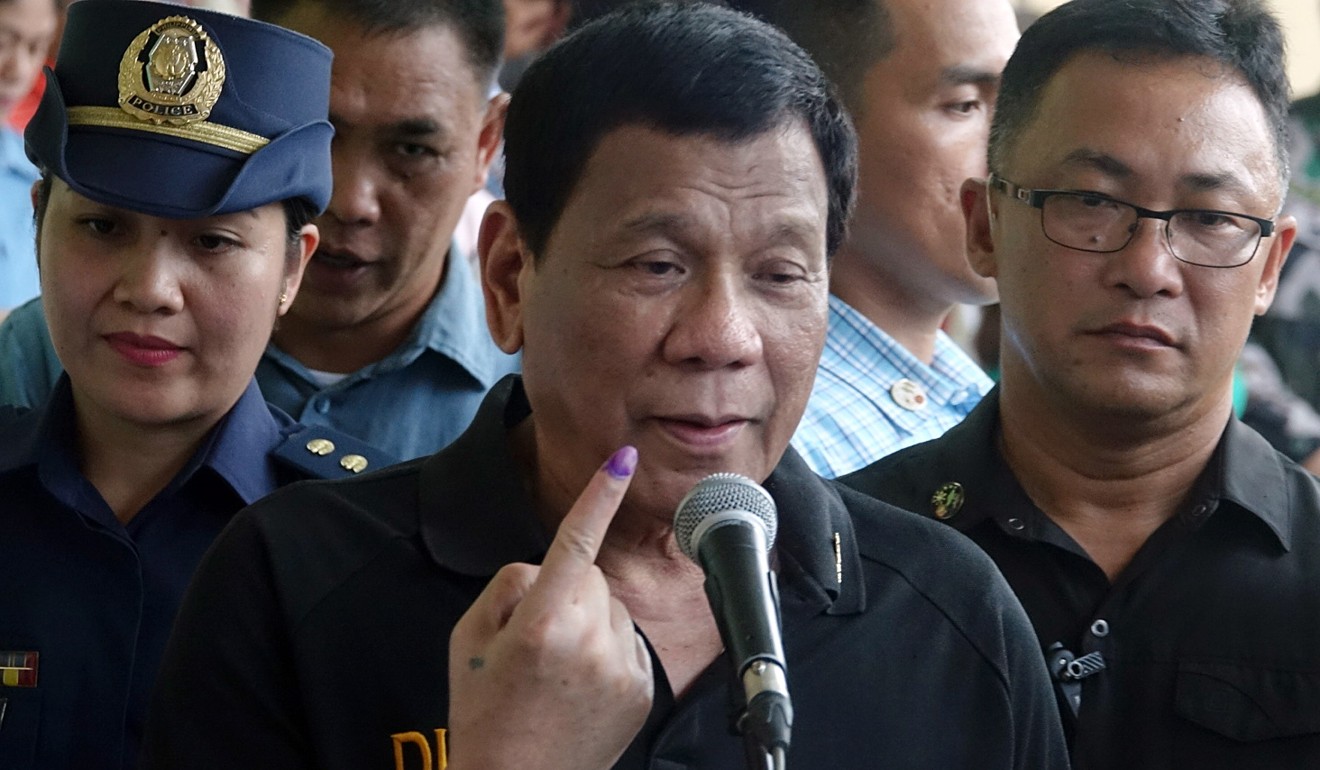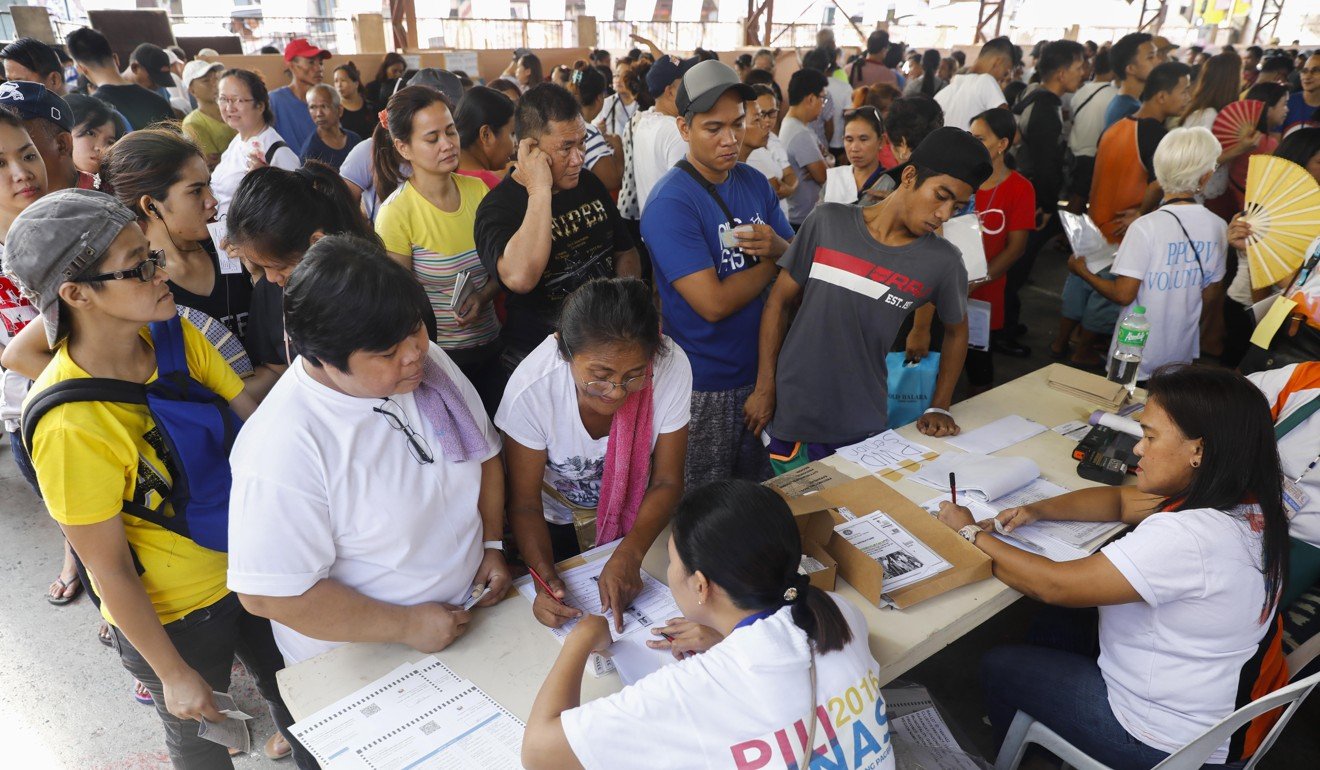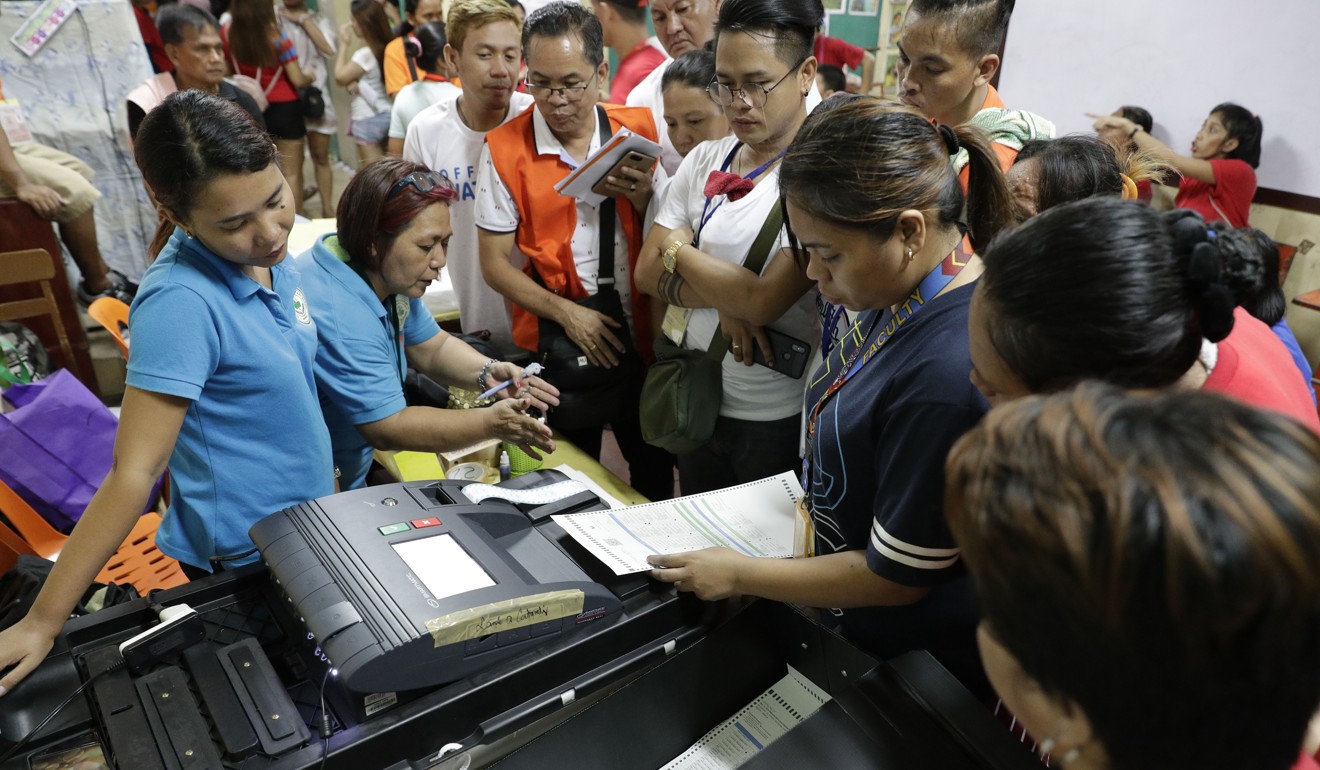
Philippine midterm elections: Duterte-backed senatorial candidates leading in race, according to unofficial count
- With 94 per cent of ballots counted early on Tuesday, Duterte allies were on track to take nine of 12 open seats in the upper house
- Duterte indicates he will use a Senate majority to legally grab power – either through forcing a constitutional change or revolutionary government
Philippine President Rodrigo Duterte’s allies were poised for victory in midterm polls, unofficial results showed on Tuesday, signalling firm approval of his rule and clearing a path for his most controversial plans.
With 94 per cent of ballots counted early on Tuesday, Duterte allies were on track to take nine of 12 open seats in the upper house.
They include Christopher “Bong” Go, a former close aide of Duterte; Bong Revilla, a former senator who was jailed then acquitted for embezzling hundreds of millions in public funds but told by the court to return the money; Ronald “Bato” dela Rosa, a former police chief who implemented Duterte’s deadly “war on drugs”; and Imee Marcos, the daughter of brutal late dictator Ferdinand Marcos, for whom Duterte has repeatedly expressed admiration.
The 12 winning senators will fill out the 24-member chamber. Official, complete results from the nation’s elections commission are expected in the coming days.
Duterte has made no secret of his plans if candidates he supports win a majority in the upper house: he has promised to rewrite the constitution to shift to a federal form of government, among other things.
His critics say this is a bid to extend his hold on power and also weaken the nation’s democratic institutions.
But political analyst Ramon Casiple, executive director of the Institute for Political and Electoral Reform, said that might not automatically happen – some of the winners will have their own ambitions. In particular, they will be looking to the presidential elections in 2022, when Duterte is supposed to step down.
“There will be a new dynamic after 2019 for those looking at 2022,” Casiple said.
He pointed to re-electionist independent senator Grace Poe, who has dominated pre-election surveys. According to Casiple, she might not necessarily go along with changing the constitution.
“If she decides to run for president and the [Duterte] administration doesn’t make her its candidate, she will fashion herself as an opposition member,” he said.

Duterte is known internationally for his foul-mouthed tirades and deadly drug war, but remains hugely popular among Filipinos fed up with the country’s general dysfunction and leaders who have failed to fix it.
He wants to bring back capital punishment for drug-related crimes as part of his narcotics crackdown, in which thousands of alleged pushers and users have already been killed by police.
How a strong showing for Duterte could clear path for death penalty to return
His tough-on-crime platform – which also includes lowering the age of criminal responsibility from 15 to 12 – was key to his landslide election victory in 2016.
“If you agree with me then you can vote for my candidates,” Duterte, who was not on the ballot, told reporters after casting his vote. “If I am repudiated by the loss of all my candidates … that’s that.”

On Monday, polling stations were officially to close at 6pm local time, but hours later, most were still open because of a delayed opening or a late rush in a nation where some 61 million people were registered to vote.
The race wasn’t just national, it was local. Among the key areas that the public watched was the mayoral race in the capital, Manila, where disgraced former President Joseph Estrada was fighting for his political life against a young protégé, actor Francisco “Isko” Moreno.
Another seat is the mayorship of the country’s financial district Makati City where two children of former Vice-President Jejomar Binay are bitterly pitted against each other.

Although many predict a victory for the Duterte team, some detractors were unfazed.
Leila B, a manager in a multinational company, deliberately shortened a work assignment abroad so she could return home to vote.
“We need to put people in the government who are more responsible, more accountable than what we currently have, people who care more about the country and the Filipino people than themselves,” she said.
Reacting to surveys showing the Duterte bets winning, she said: “Surveys lie, no giving up without fighting.”

The first-time voter said the nation’s future was at stake: “Because if things become really bad, I know a lot of people who are considering migrating, depending on the results of the election, and they include me and my family.”
Reports of massive vote-buying as well as voter intimidation, complicated by numerous instances where the voting machines failed, poured in throughout the day. A private election watchdog Kontra Daya said it received reports of more than 288 such incidents from its volunteer network.
China ‘can do business with Philippines, if it respects our sovereignty’: trade secretary
The system saw voters using pens to shade circles in a two-page ballot that listed candidates for the Senate, Congress party list, governors, mayors and councillors.
The sheets were then fed into a vote counting machine, which spit out a small receipt that confirmed the voter’s choice. The receipt was then inserted into a box and the voter had an index finger daubed with purple ink to show she had voted.

In precincts where the system worked, voting went smoothly and swiftly, but in many places, the machines broke down, forcing voters to wait for repairs or replacements.
Leila B said there was confusion in her precinct when voting machines broke down.
38 dead, ‘plots’ against president: what’s behind Philippine election chaos?
“There was a lot of back and forth as to what should be done,” she said. “The tech people were kids who either didn’t know what to do, or didn’t have the authority to do anything but to call someone up on the phone for instructions.”
Because of breakdowns, many voters were unable to view their receipts and expressed fears on social media that their votes might be spoiled or changed.

James Jimenez, spokesman of the Commission on Elections (Comelec), said: “We did not say this will be a perfect elections. Yes, issues are cropping up, but they are being addressed.”
Other troubles the Comelec has faced include a boat carrying a voting machine sank near Darajuay Island in Catbalogan, Samar, just before the election. The coastguard rescued the seven people on the boat and fished the machine out of the water. There was no report if the machine was still usable.
Duterte must find an heir – or face the music on his drug war
Philippine elections are famously violent, but there were no reports of fatalities on election day, although a gun that went off at the end of the voting caused a minor scare. Jimenez said a security guard’s firearm had accidentally discharged in one of the tents in Comelec’s canvassing centre.
Additional reporting by Agence France-Presse


